The Academic and Professional Writing Program welcomes five new faculty members this Fall.
Kiera Allison, Assistant Professor, General Faculty
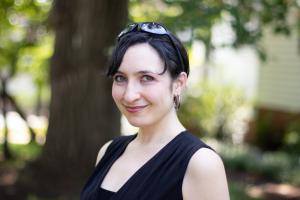 A literary critic, sound historian, and medical humanist, Kiera Allison specializes in the history of listening and sound in the context of the modern clinic. Her research covers the last two centuries of cardiology, neurology, and psychoanalysis (from the invention of the stethoscope in 1819 to the rise of Freud and the talking cure in the 1890s, to the narrative-medicine movement of the latter 20th century), which she studies against larger trends in postclassical dialogue, poetics, and music.
A literary critic, sound historian, and medical humanist, Kiera Allison specializes in the history of listening and sound in the context of the modern clinic. Her research covers the last two centuries of cardiology, neurology, and psychoanalysis (from the invention of the stethoscope in 1819 to the rise of Freud and the talking cure in the 1890s, to the narrative-medicine movement of the latter 20th century), which she studies against larger trends in postclassical dialogue, poetics, and music.
Allison was a doctoral fellow of the Social Sciences and Humanities Research Council of Canada (2007-2010), and a postdoctoral fellow at Emory University’s Fox Center for Humanistic Inquiry (2017-18) where she worked on her current book-in-progress, Sound Relations: The Culture of Listening in Modern Medicine. She earned a B.A. in English from the University of Toronto, and a Ph.D. in English language and literature from the University of Virginia.
This academic year, Allison will be teaching classes on “Public Speaking” and “Writing about Medicine,” while researching the uses of narrative and close-listening in medical and premedical education.
Tamika L. Carey, Associate Professor
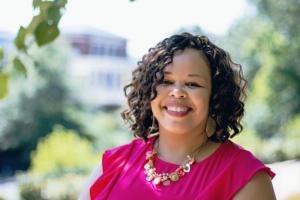 Tamika L. Carey is an interdisciplinary scholar and teacher specializing in cultural and feminist rhetoric practices, African-American rhetorical and literacy traditions, Black women’s writing and intellectual histories, and the memoir. She is committed to studying how writing, language, and assumptions about literacy promote and complicate the wellbeing of Black women and African-American communities at large.
Tamika L. Carey is an interdisciplinary scholar and teacher specializing in cultural and feminist rhetoric practices, African-American rhetorical and literacy traditions, Black women’s writing and intellectual histories, and the memoir. She is committed to studying how writing, language, and assumptions about literacy promote and complicate the wellbeing of Black women and African-American communities at large.
Her articles appear in such journals as Rhetoric Review, Enculturation: A Journal of Rhetoric, Writing, and Culture, Signs: A Journal of Women in Society, and Rhetoric Society Quarterly. Her 2016 book Rhetorical Healing: The Reeducation of Contemporary Black Womanhood is a feminist critique of African-American self-help culture that unearths the messages about gender, learning and community obligation circulating within three of the most popular black women’s wellness campaigns of the last three decades. She is currently working on two research projects: a study of apologia and call-out culture centralizing women’s freedom of speech controversies and an exploration of writing and healing practices in the memoir.
In addition to her scholarly writing, Carey is the author of Getting to Know Him: Observations and Experiences from My Walk of Faith, an inspirational memoir, and several magazine articles.
Before joining the Arts & Sciences faculty, she served as an English faculty member and a Women, Gender, and Sexuality Studies faculty affiliate at the University at Albany, SUNY and a member of the University of North Carolina at Pembroke’s English, Theater, and Foreign Language Department and African American Studies program. She holds a doctorate from Syracuse University’s Composition and Cultural Rhetoric Program and a Certificate of Advanced Studies from its Women, Gender, and Sexuality Studies department.
This fall, she will teach an advanced writing seminar on the multicultural memoir. She looks forward to teaching courses in Black women’s writing and rhetoric, and African-American rhetorics in the near future.
Anastatia Curley, Associate Director of Pedagogy and Assistant Professor, General Faculty
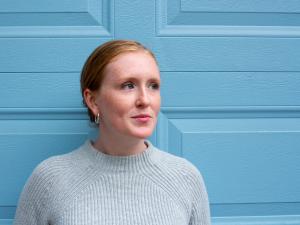
At the intersection of novel studies, new media studies, and writing studies, Anastatia Curley's research considers the relationship between the form and history of the novel and the ways that social media encourages users to share themselves with the rest of the world. Her book project, tentatively titled Friends and Followers, examines techniques of character in contemporary novels and the modes of relation they imply. Her work has appeared in Politics/Letters and The Atlantic.
Curley earned her Ph.D. in English from the University of Virginia and holds a bachelor's degree in English from Yale University and a master’s degree in Irish Studies from Boston College. This year, she will be teaching Writing and Critical Inquiry seminars as well as a graduate course on pedagogy.
T. Kenny Fountain, Director of Writing Across the Curriculum and Associate Professor
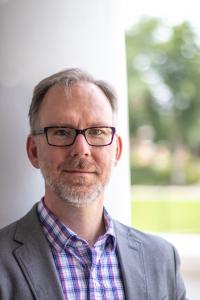 T. Kenny Fountain’s primary research areas are the history of rhetoric, the rhetoric of science and medicine, and writing in the disciplines. He is the author of Rhetoric in the Flesh: Trained Vision, Technical Expertise, and the Gross Anatomy Lab (Routledge, 2014), an ethnographic study of the human cadaver lab that examines how rhetorical discourses, visual objects, and embodied practices facilitate learning while simultaneously shaping medical and dental students’ conceptions of the human body.
T. Kenny Fountain’s primary research areas are the history of rhetoric, the rhetoric of science and medicine, and writing in the disciplines. He is the author of Rhetoric in the Flesh: Trained Vision, Technical Expertise, and the Gross Anatomy Lab (Routledge, 2014), an ethnographic study of the human cadaver lab that examines how rhetorical discourses, visual objects, and embodied practices facilitate learning while simultaneously shaping medical and dental students’ conceptions of the human body.
Fountain’s current book project, "To See What is Persuasive: Politics, Affect, and the Rhetorical Imagination," reads contemporary political texts in light of ancient Roman rhetorical theory and recent cognitive science, in order to demonstrates how a kind of verbal vivacity stirs our passions by exploiting our memories, identifications, and prejudices.
Fountain earned his Ph.D. in Rhetoric and Scientific Communication from the University of Minnesota. He has worked in writing program administration at Bilkent University, Yeshiva University, and Case Western Reserve University. As the new Director of Writing Across the Curriculum, he will assist the Quality Enhancement Plan focused on student writing and work with individual schools, departments, and programs that seek to incorporate writing instruction into their courses.
This fall Fountain will teach a section of “Writing About Science and Technology.”
Kevin Smith, Assistant Professor, General Faculty
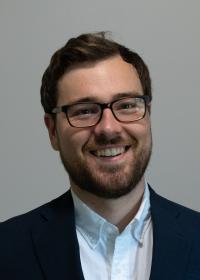 Kevin G. Smith’s research interests sit at the intersection of writing studies and the digital humanities and include digital rhetoric and writing, markup languages, rhetorical genre studies, writing pedagogies, and writing program administration. His research is broadly concerned with the rhetorical practices of students and other writers across contexts working within and through digital technologies and his work has appeared in Computers and Composition, Research in the Teaching of English, and Digital Humanities Quarterly.
Kevin G. Smith’s research interests sit at the intersection of writing studies and the digital humanities and include digital rhetoric and writing, markup languages, rhetorical genre studies, writing pedagogies, and writing program administration. His research is broadly concerned with the rhetorical practices of students and other writers across contexts working within and through digital technologies and his work has appeared in Computers and Composition, Research in the Teaching of English, and Digital Humanities Quarterly.


